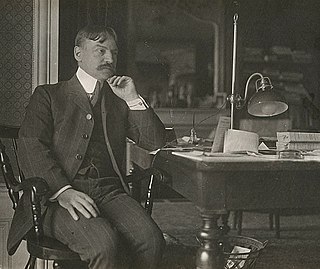Conservatism is a cultural, social, and political philosophy and ideology, which seeks to promote and preserve traditional institutions, customs, and values.
Right-wing politics is the range of political ideologies that view certain social orders and hierarchies as inevitable, natural, normal, or desirable, typically supporting this position based on natural law, economics, authority, property, religion, or tradition. Hierarchy and inequality may be seen as natural results of traditional social differences or competition in market economies.

Populism is a range of political stances that emphasize the idea of "the people" and often juxtapose this group with "the elite". It is frequently associated with anti-establishment and anti-political sentiment. The term developed in the late 19th century and has been applied to various politicians, parties and movements since that time, often as a pejorative. Within political science and other social sciences, several different definitions of populism have been employed, with some scholars proposing that the term be rejected altogether.

Fidesz – Hungarian Civic Alliance is a right-wing populist and national-conservative political party in Hungary, led by Viktor Orbán.

Anne Elizabeth Applebaum is an American and naturalized-Polish journalist and historian. She has written extensively about the history of Communism and the development of civil society in Central and Eastern Europe.

Law and Justice is a right-wing populist and national-conservative political party in Poland. Its chairman is Jarosław Kaczyński.

Viktor Mihály Orbán is a Hungarian lawyer and politician who has been Prime Minister of Hungary since 2010, previously holding the office from 1998 to 2002. He has led the Fidesz political party since 1993, with a break between 2000 and 2003.
The term "illiberal democracy" describes a governing system that hides its "nondemocratic practices behind formally democratic institutions and procedures". There is a lack of consensus among experts about the exact definition of illiberal democracy or whether it even exists.

Julien Benda was a French philosopher and novelist, known as an essayist and cultural critic. He is best known for his short book, La Trahison des Clercs from 1927.

Right-wing populism, also called national populism and right-wing nationalism, is a political ideology that combines right-wing politics and populist rhetoric and themes. Its rhetoric employs anti-elitist sentiments, opposition to the Establishment, and speaking to or for the "common people". Recurring themes of right-wing populists include neo-nationalism, social conservatism, economic nationalism and fiscal conservatism. Frequently, they aim to defend a national culture, identity, and economy against perceived attacks by outsiders. Right-wing populism has remained the dominant political force in the Republican Party in the United States since the 2010s.
British neoconservatism is an ideology that is a strong proponent of foreign intervention in the Arab world and beyond, supports the role of the private sector in military contracts and is in favour of an alliance with Israel. It shares a world view with its American counterpart in regards to threats and opportunities.
Andrew Arato is a professor of Political and Social Theory in the Department of Sociology at The New School, best known for his influential book Civil Society and Political Theory, coauthored with Jean L. Cohen. He is also known for his work on critical theory and constitutions and was from 1994 to 2014 co-editor of the journal Constellations with Nancy Fraser and Nadia Urbinati.
In political science, the terms reactionary right and populist right have been used to refer to the range of nationalist, right-wing to far-right parties that have grown in support since the late 1970s in Europe. Populist right groups have shared a number of causes, which typically include opposition to globalisation and immigration, criticism of multiculturalism, and opposition to the European Union, but do not oppose democracy.

Trumpism is an authoritarian political movement that follows the political ideologies associated with Donald Trump and his political base incorporating ideologies such as right-wing populism, national conservatism, neo-nationalism, and neo-fascism. Trumpist rhetoric heavily features anti-immigrant, xenophobic, nativist, and racist attacks against minority groups. Other identified aspects include conspiracist, isolationist, Christian nationalist, protectionist, anti-feminist, and anti-LGBT beliefs. Trumpists and Trumpians are terms that refer to individuals exhibiting its characteristics.

Democratic backsliding is a process of regime change towards autocracy that makes the exercise of political power by the public more arbitrary and repressive. This process typically restricts the space for public contestation and political participation in the process of government selection. Democratic decline involves the weakening of democratic institutions, such as the peaceful transition of power or free and fair elections, or the violation of individual rights that underpin democracies, especially freedom of expression. Democratic backsliding is the opposite of democratization.
Authoritarian capitalism, or illiberal capitalism, is an economic system in which a capitalist market economy exists alongside an authoritarian government. Related to and overlapping with state capitalism, a system in which the state undertakes commercial activity, authoritarian capitalism combines private property and the functioning of market forces with repression of dissent, restrictions on freedom of speech and either a lack of elections or an electoral system with a single dominant political party.

The anti-gender movement is an international movement that opposes what it refers to as "gender ideology", "gender theory" or "genderism", terms which cover a variety of issues and do not have a coherent definition. Members of the anti-gender movement primarily include those of the political right-wing and far right, such as right-wing populists, conservatives, and Christian fundamentalists. It has been linked to a shift away from liberal democracy and towards right-wing populism. Anti-gender rhetoric has seen increasing circulation in trans-exclusionary radical feminist (TERF) discourse since 2016. Members of the anti-gender movement oppose some LGBT rights, some reproductive rights, government gender policies, gender equality, gender mainstreaming, and gender studies academic departments. The Canadian Security Intelligence Service has linked the anti-gender movement to the risk of "extreme violence" against the LGBT+ community.
Péter Krekó is a Hungarian economist, political psychologist, political scientist, and professor. He currently serves as the Director of the Political Capital Institute, and as a senior external researcher for the Center for European Policy Analysis.
Maciej Kisilowski is a Polish academic. He is associate professor in law and strategy at Central European University as well as the faculty director of CEU Executive MBA program. He is an expert on public-sector strategy as well as nonmarket strategy of businesses.
Liberalism has been a notable ideology in Poland for hundreds of years. Polish liberalism emphasizes the preservation of democracy and opposition to authoritarianism. Liberalism was first developed in Poland as a response to the Polish–Lithuanian monarchy, and it continued to develop in response to the partition of Poland through the 19th century and Communist rule in the 20th century. Poland has officially been a liberal democracy since 1989, though its status has challenged as a result of illiberal reforms in the 2010s and 2020s.










